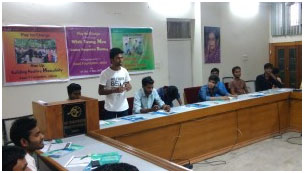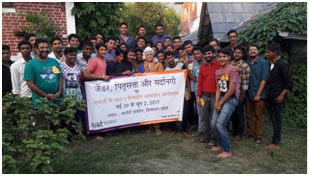ABOUT THE MEN FOR GENDER JUSTICE PROGRAMME
The Men for Gender Justice programmes increases the knowledge and capacity of young men to act against violence against women and enhance their understanding on gender, patriarchy and masculinities. Through training sessions and other activities, the participants are provided with the information and training they need for co-creating spaces in their communities that promote gender equality and support women to live without violence and work in non-traditional livelihoods.
In 2016-17, Men for Gender Justice programme expanded its reach across Delhi and Jaipur with 22 active groups with 140 members.
‘I STOPPED BEING PART OF THE GROUPS THAT HARASS GIRLS, AS NO ONE HAS THE RIGHT TO DO THIS TO GIRLS. I STARTED HELPING WITH DOMESTIC WORK AND ALSO STARTED DISCUSSING THESE ISSUES WITH MY FRIENDS, RELATIVES AND NEIGHBOURS.’ NARESH, DELHI
WHY ARE WE DOING IT?
Azad Foundation believes that engaging with young men is crucial for the process of empowerment of women on their journey to access non-traditional livelihoods with dignity and reclaim control over their own lives. Unless stereotypical ideas of femininity and masculinity are challenged, empowered women can face discrimination and domestic violence from those who define ‘real men’ as those who exercise control over women. As a result, Azad Foundation introduced a new programme in 2014, Men for Gender Justice, which facilitates support groups of young men from the same communities as the Women on Wheels programme trainees, creating a support network for the trainees in their own communities.
The Men for Gender Equality programme works with urban, resource poor men in the age group of 18-25 years with the belief that men too can become change agents and actively contribute to creating a gender just society.
HOW IT WORKS
We have formed groups of men around themes of sports, theatre and other creative activities in Delhi and Jaipur. Men taking part in these groups attend various workshops and awareness and educational activities designed to question gender-based injustice and traditional concepts of masculinity. The programme also includes film screenings, street plays and informal discussions through

which gender myths can be busted and men themselves start questioning hegemonic and oppressive masculinities that restrict both women and men from attaining fulfilling lives. They are encouraged to engage with other men in their families and communities to change harmful attitudes and behaviours towards women.
Tracker surveys completed by men taking part in these groups in 2016/17 reveal significant changes in attitudes, for example:
- 98% of participants that previously believed the statement ‘women are responsible for the violence they face by men’ now disagree.
- The belief that men and women should play gender-specific roles in public and home life has shifted. 44 out of 55 participants have come to disagree with this work-based gender binary over the year.
- In 2017, 93% of the surveyed men answered yes to the question ‘Would you encourage any women from your house / community getting enrolled to learn driving to become professional chauffeur?’, indicating a high support for non-traditional livelihoods for women.

Participants in a residential training exploring gender, patriarchy, masculinity and sexuality 29 May – 2 June 2017.
To learn more about the programme, contact Programme Coordinator, Suraj Pawar.






